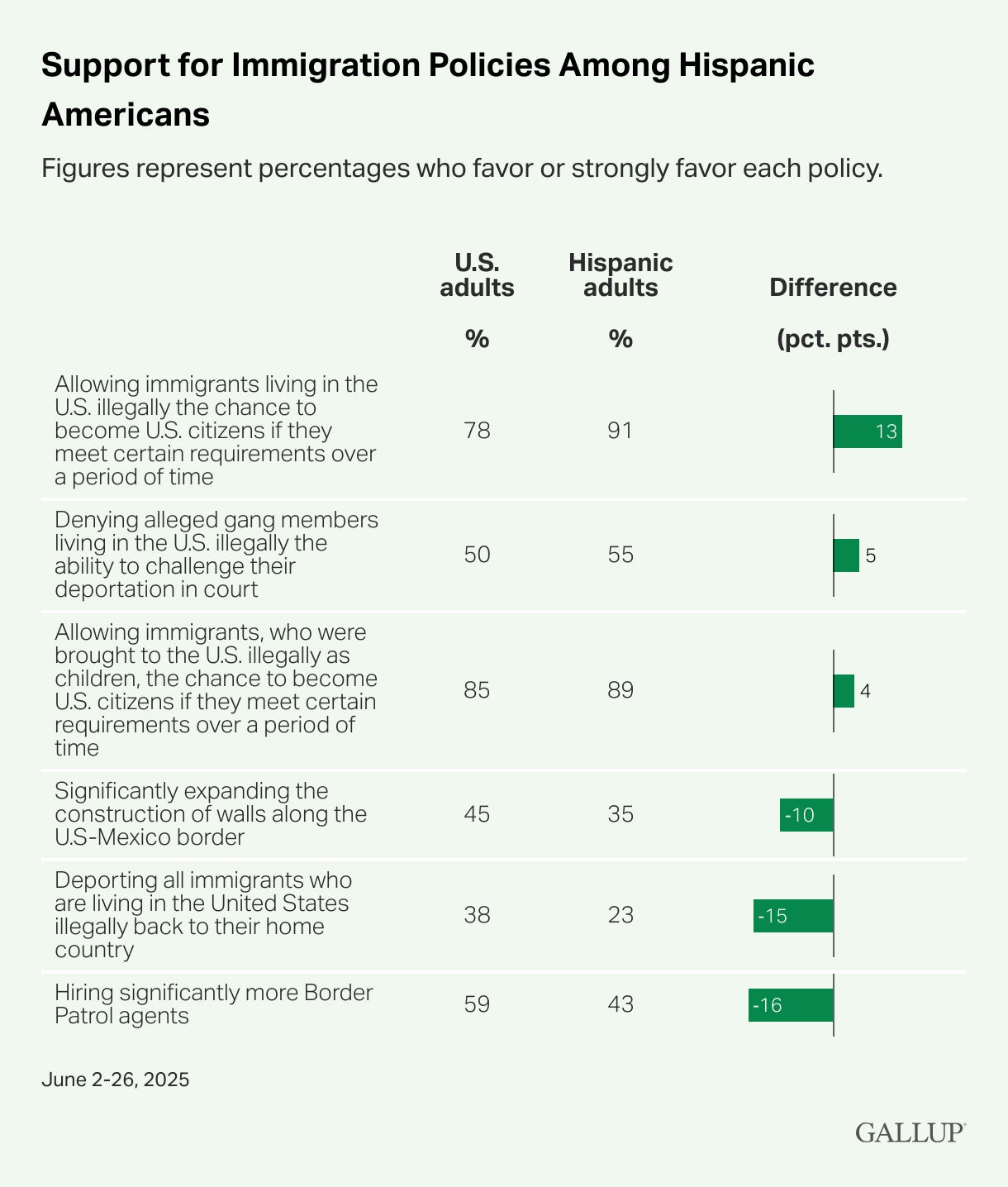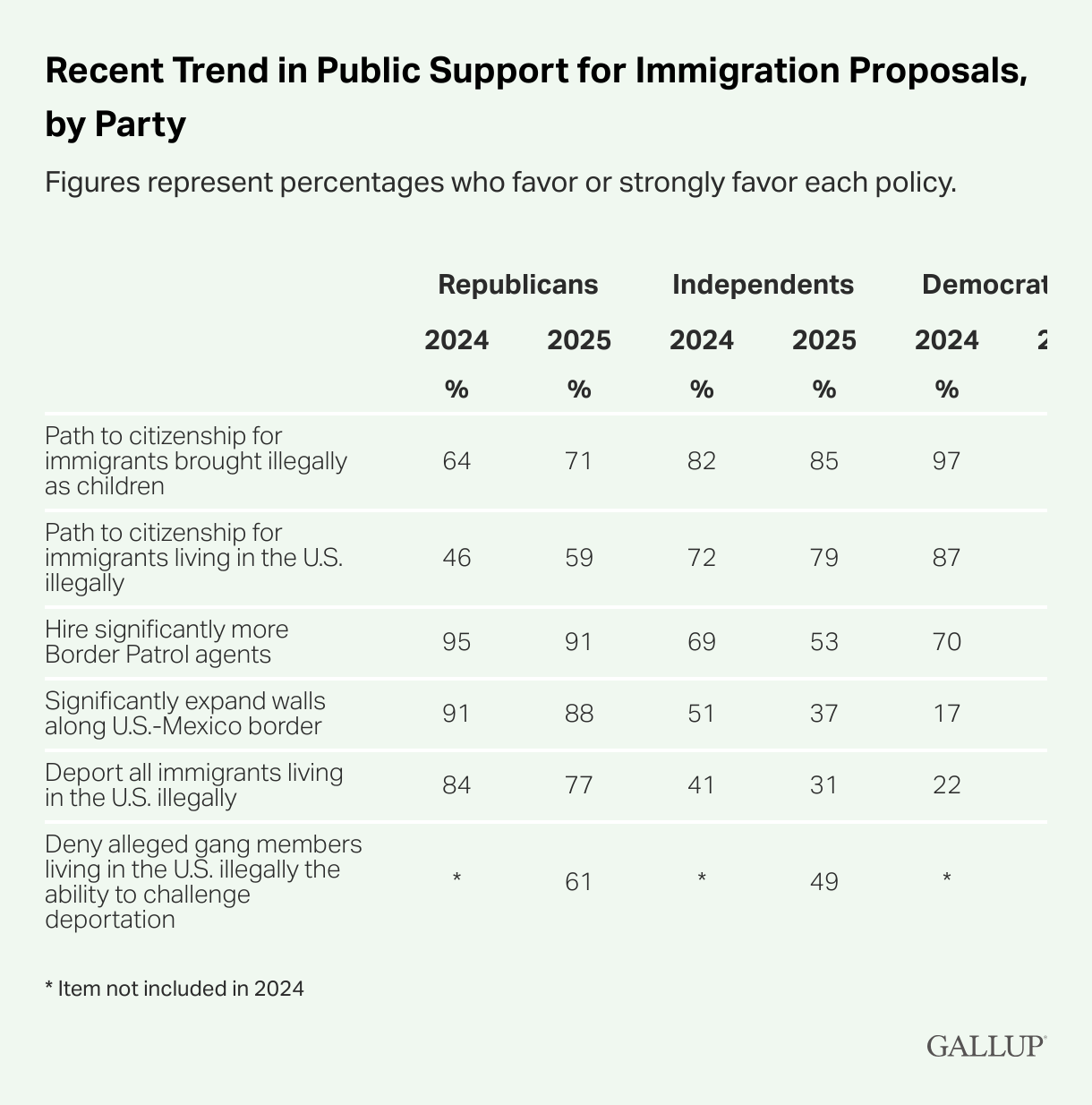Backlash to Anti-Immigration Fever Has Arrived
The predictable consequences of political overreach are now playing out exactly as forecasted.
Back in January, I warned that on the immigration debate, there would be no winner, but there would be a loser. And the loser would inevitably be whichever side overreached first. Yesterday’s Gallup polling data confirms this prediction with crystalline clarity: Donald Trump and the Republicans have overreached, and they’re paying a very steep price.
The numbers are damning for the administration. The percentage of Americans wanting less immigration has dropped by nearly half this year to 30%, with 79% now saying immigration benefits the U.S.
I have never seen a cut in half in thirty days.
Jaw-dropping.
About 8 in 10 Americans now say immigration is “a good thing” for the country today, an increase from 64% a year ago and a high point in the nearly 25-year trend.
But as I said months ago, this was entirely predictable. The shift represents a large movement in political opinions driven by two critical developments that anyone paying attention could have seen coming.
The first factor is undeniably the success of border enforcement measures. With illegal border crossings down sharply this year, fewer Americans than in June 2024 back hard-line border enforcement measures, suggesting that voters’ primary concern about border security has been largely addressed.
The Trump administration’s swift action upon taking office appears to have satisfied many Americans’ desire for border control, creating space for more nuanced views on immigration policy overall. When the immediate crisis perception subsides, voters naturally begin to evaluate the broader implications and methods of immigration policy. This shift from crisis mode to policy evaluation mode has proven pivotal in reshaping public opinion.
But the most telling evidence of Republican overreach lies in the large political shift among Republicans themselves. And this is where things really get squirrelly. About two-thirds of Republicans now say immigrants are “a good thing” for the country, up from 39% last year. This 27-percentage-point swing among the party’s own base is precisely what happens when a political movement goes too far, too fast.
This Republican evolution was entirely foreseeable once the administration moved beyond border security into aggressive interior enforcement. The masked, jack-booted thugs Republicans have raised alarm bells about in paranoid fever dreams are being deployed by their own guy! A majority of Americans, 54%, now describe ICE’s actions as having “gone too far.” When even 31% of Republicans say ICE hasn’t gone far enough while another 49% call current actions appropriate, you’re looking at a party base fracturing over tactics. Stephen Miller and Tim Homan represent the hard-core nativist 31% MAGA base, and it’s repelling a majority of Republicans.
The warning signs were flashing red when the administration shifted from targeting dangerous criminals to conducting workplace raids and mass deportations. As I predicted, this overreach created visible discomfort even among Trump’s supporters. Republican congressman David Valadao, who represents the most Mexican-American congressional district in the country, represented by a Republican, said he’s concerned about the administration’s deportation policy shift to workplaces, urging them to “prioritize the removal of known criminals over the hardworking people who have lived peacefully” in the country for years.
Latinos, unsurprisingly, have demonstrated the most pronounced opposition to current policies. Trump’s 21% approval rating on the issue among Hispanic adults is below his 35% rating nationally, with the deficit likely reflecting that group’s low support for some of the administration’s signature immigration policies. This demographic shift has particular electoral significance, as Latino voters continue to represent a growing share of the American electorate.
The militarization of immigration enforcement has struck many Hispanic Americans as fundamentally un-American. Hispanic and Black Americans are deeply skeptical of the administration’s immigration policies: Fewer than four-in-ten Hispanic Americans approve of seven out of the eight policies included in the Gallup survey.
Ironically, as public opinion shifts away from harsh enforcement measures, Congress just passed the “One Big Beautiful Bill” that dramatically expands immigration enforcement capabilities. The law will also provide ICE with the funding to hire 10,000 new agents, which would allow the rate of deportations to reach as high as 1 million per year. The legislation also includes $4.1 billion to hire additional CBP personnel, including 3,000 more customs officers and 3,000 new Border Patrol agents.
This massive expansion of enforcement infrastructure comes precisely as more favorable pathways to citizenship for undocumented immigrants already in the U.S. The timing suggests a fundamental disconnect between policy implementation and public sentiment.
The polling data confirms what should have been obvious to any seasoned political observer: Americans reached a nuanced position on immigration that the Trump administration completely misread. They wanted border security, and got it. But they never signed up for the militarization of American communities and the targeting of working families. There was never a mandate for federal government overreach, the destruction of constitutional rights, and the usurpation of due process.
This wasn’t some unpredictable political earthquake. It was the entirely predictable result of a party that confused electoral victory with a mandate for extremism. The Trump administration’s overreach on immigration enforcement has generated exactly the opposition that clear-eyed observers predicted it would.
Yet the data reveals an even more dangerous political dynamic for Republicans. While 31% of Republicans still don’t believe ICE’s actions are sufficient and want more aggressive enforcement, the 49% who view current actions as appropriate represent a critical vulnerability. This split suggests that the Trump administration’s continued reliance on its MAGA base, which demands 31%, could drive his support levels dangerously lower among both mainstream Republicans and Hispanic voters.
Both constituencies are critical not just to Trump’s coalition but to Republican survival in the upcoming midterms. Hispanic voters, with Trump’s dismal 21% approval rating on immigration, represent a growing electoral force that Republicans can ill afford to alienate further. Meanwhile, nearly half of Republicans who think current enforcement levels are appropriate signal potential defection if the administration continues catering to its most extreme supporters.
The question now isn’t whether the backlash to anti-immigration sentiment has arrived; it’s whether political leaders will learn from this predictable failure or continue implementing policies that an increasingly skeptical public views as having gone too far. History suggests they probably won’t learn, which means this shift in political opinions is likely just getting started, with potentially devastating consequences for Republican electoral prospects.
For a wide swath of Americans, the anti-immigration sentiment of the past few years has broken.
Support quality content that matters to you, upgrade to a paid subscription for exclusive analysis and behind-the-scenes perspectives. Your support allows us to continue this important work.









Great analysis, Mike, as usual. Perhaps you or a Lincoln Project colleague would also consider
writing a piece that clarifies the roles & responsibilities of ICE, Border Patrol and CBP? I'm a reasonably well-informed voter, but would certainly appreciate a sort of "Immigration 101" given our overwhelmingly complex immigration system.
And while you're at it, perhaps include an even simpler, dumbed-down primer (for our president) that explains the terms & processes of "asylum seekers," "employment authorization;" ICE detention vs. criminal jail/prison sentences; and civil immigration violations vs. criminal convictions. Thanks for all you folks do!
Thanks for your live video going through these details Mike. Hearing that kids are sitting in cars all day while their parents work hard in the fields gutted me. And here's family separation all over again, with ramped up cruelty, fear and violence by ICE. Maybe the inhumane treatment we're witnessing is breaking through and starting to reflect in these polls...and our souls.